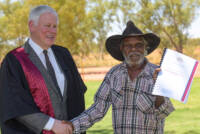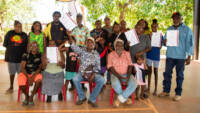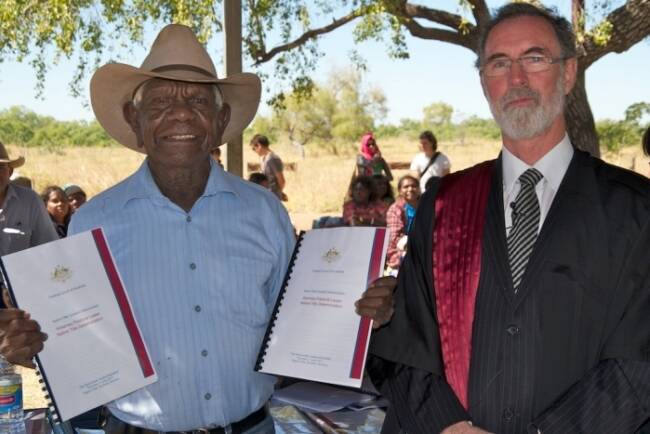Native title
On 3 June, 1992, the High Court of Australia delivered its landmark Mabo decision which rewrote the Australian common law and gave a massive boost to the struggle for the recognition of Aboriginal land rights.
Traditional owner Jimmy Wavehill and the Federal Court’s Justice Mansfield at consent Native Title determination celebrations at Pigeon Hole in 2011.
Put simply, the decision said that under Australian law, Aboriginal people have rights to land – rights that existed before colonisation and which still exist. This right is called native title.
By a majority of six to one, the High Court ruled that native title to land is recognised by the common law of Australia, throwing out forever the legal fiction that when Australia was "discovered" by Captain Cook in 1788 it was terra nullius, an empty or uncivilised land.
The case centred on the Murray Islands in the eastern part of the Torres Strait Islands between Australia and Papua New Guinea. The Meriam people, led by Eddie Koiki Mabo, took the action to the High Court to overturn the doctrine of terra nullius.
The judges in the case declared that:
“... the Meriam people are entitled as against the whole world to possession, occupation, use and enjoyment of the lands of the Murray Islands”
It was the first time that the High Court had considered the position of Indigenous people in Australian property law and their judgement was not restricted to the Murray Islands.
Justice Brennan said: “... there may be other areas of Australia where an Aboriginal people, maintaining their identity and their customs, are entitled to enjoy their native title.”
Reviewing the history of non-Aboriginal Australia, Justice Brennan wrote: “Aborigines were dispossessed of their land parcel by parcel, to make way for expanding colonial settlement. Their dispossession underwrote the development of the nation.”
Settlements, land grants and pastoral leases: “... spread across the continent to dispossess, degrade and devastate the Aboriginal peoples and leave a national legacy of unutterable shame. The acts and events ... (of Aboriginal) dispossession ... constitute the darkest aspect of the history of this nation... The nation as a whole must remain diminished unless and until there is an acknowledgment of, and retreat from, those past injustices.” - Justices Dean and Gaudron
While recognising the existence of native title, the High Court also confirmed the sovereignty of governments and said that they had the power to acquire native title providing they kept within the law, particularly the Racial Discrimination Act 1975.
Sections of the mining and pastoral industries, and conservative politicians, reacted angrily to the High Court's decision and urged the Commonwealth Government to overturn it by legislation. They conducted a massive fear campaign against the newly-established land rights of Indigenous Australians.
Related Stories

‘Tears of joy for the old people’: native title holders celebrate recognition of rights in country
Oct 29, 2020
More than 150 people gathered at Old Banka Banka Homestead for a native title Consent Determination over pastoral leases in the Barkly region.

‘It’s always been in our hearts’ – an emotional day at Elliott for native title holders for Buchanan Downs and Hidden Valley pastoral leases
Oct 30, 2020
The Northern Land Council congratulates the native title holders of two Barkly Region pastoral leases for their hard work resulting in the long-overdue recognition of their native title rights to country in an historic ceremony at the Northern Territory town of Elliott yesterday.
Land Rights Act key for Mirarr traditional owners
Sep 3, 2020
A long struggle by the Mirarr people for ownership and control over the Jabiru township met with success today with the passage of the Aboriginal Land Rights (Northern Territory) Amendment (Jabiru) Act 2020.


